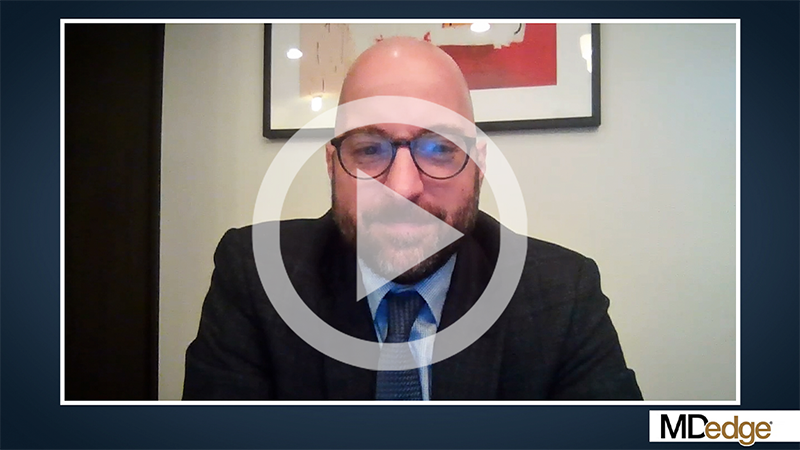User login
Diffuse Large B-Cell Lymphoma Highlights From ASH 2023
Highlights in diffuse large B-cell lymphoma (DLBCL) from the 2023 American Society of Hematology (ASH) Annual Meeting and Exposition that are particularly relevant to Veterans Health Administration (VHA) patients are reported by Dr Nicholas Burwick of Puget Sound VA Health Care System.
Dr Burwick begins with a large VHA study examining racial disparities in DLBCL outcomes among veterans. Importantly, overall survival was not significantly different across racial groups.
He next covers two studies in the DLBCL frontline setting. The first examines the efficacy of standard-dose R-CHOP; reduced-intensity R-CHOP; and an anthracycline alternative regimen among older patients. Standard-dose R-CHOP yielded superior results in patients aged 70- to 79-years but not for those older than 80 years, a group that merits further study.
The second frontline study focused on the chemotherapy-free regimen mosunetuzumab plus the antibody-drug conjugate polatuzumab vedotin (pola) in patients who are older and unfit for chemotherapy. The combination showed good preliminary efficacy.
Turning to relapsed/refractory patients, Dr Burwick discusses a real-world study examining response rates to tafasitamab in White vs Black/African American patients and non-Hispanic vs Hispanic patients. Differences between the two groups proved minimal.
Finally, he discusses a study of the bispecific antibody glofitamab and pola in heavily pretreated patients that showed promising results in this population.
--
Nicholas R. Burwick, MD, Associate Professor, Department of Medicine, Division of Hematology, University of Washington; Staff Physician, Department of Medicine, Division of Hematology, Puget Sound VA Health Care System, Seattle, Washington
Nicholas R. Burwick, MD, has disclosed no relevant financial relationships
Highlights in diffuse large B-cell lymphoma (DLBCL) from the 2023 American Society of Hematology (ASH) Annual Meeting and Exposition that are particularly relevant to Veterans Health Administration (VHA) patients are reported by Dr Nicholas Burwick of Puget Sound VA Health Care System.
Dr Burwick begins with a large VHA study examining racial disparities in DLBCL outcomes among veterans. Importantly, overall survival was not significantly different across racial groups.
He next covers two studies in the DLBCL frontline setting. The first examines the efficacy of standard-dose R-CHOP; reduced-intensity R-CHOP; and an anthracycline alternative regimen among older patients. Standard-dose R-CHOP yielded superior results in patients aged 70- to 79-years but not for those older than 80 years, a group that merits further study.
The second frontline study focused on the chemotherapy-free regimen mosunetuzumab plus the antibody-drug conjugate polatuzumab vedotin (pola) in patients who are older and unfit for chemotherapy. The combination showed good preliminary efficacy.
Turning to relapsed/refractory patients, Dr Burwick discusses a real-world study examining response rates to tafasitamab in White vs Black/African American patients and non-Hispanic vs Hispanic patients. Differences between the two groups proved minimal.
Finally, he discusses a study of the bispecific antibody glofitamab and pola in heavily pretreated patients that showed promising results in this population.
--
Nicholas R. Burwick, MD, Associate Professor, Department of Medicine, Division of Hematology, University of Washington; Staff Physician, Department of Medicine, Division of Hematology, Puget Sound VA Health Care System, Seattle, Washington
Nicholas R. Burwick, MD, has disclosed no relevant financial relationships
Highlights in diffuse large B-cell lymphoma (DLBCL) from the 2023 American Society of Hematology (ASH) Annual Meeting and Exposition that are particularly relevant to Veterans Health Administration (VHA) patients are reported by Dr Nicholas Burwick of Puget Sound VA Health Care System.
Dr Burwick begins with a large VHA study examining racial disparities in DLBCL outcomes among veterans. Importantly, overall survival was not significantly different across racial groups.
He next covers two studies in the DLBCL frontline setting. The first examines the efficacy of standard-dose R-CHOP; reduced-intensity R-CHOP; and an anthracycline alternative regimen among older patients. Standard-dose R-CHOP yielded superior results in patients aged 70- to 79-years but not for those older than 80 years, a group that merits further study.
The second frontline study focused on the chemotherapy-free regimen mosunetuzumab plus the antibody-drug conjugate polatuzumab vedotin (pola) in patients who are older and unfit for chemotherapy. The combination showed good preliminary efficacy.
Turning to relapsed/refractory patients, Dr Burwick discusses a real-world study examining response rates to tafasitamab in White vs Black/African American patients and non-Hispanic vs Hispanic patients. Differences between the two groups proved minimal.
Finally, he discusses a study of the bispecific antibody glofitamab and pola in heavily pretreated patients that showed promising results in this population.
--
Nicholas R. Burwick, MD, Associate Professor, Department of Medicine, Division of Hematology, University of Washington; Staff Physician, Department of Medicine, Division of Hematology, Puget Sound VA Health Care System, Seattle, Washington
Nicholas R. Burwick, MD, has disclosed no relevant financial relationships

Chronic Lymphocytic Leukemia Highlights From ASH 2022
Reporting on chronic lymphocytic leukemia (CLL) highlights from the American Society of Hematology meetings, Dr Nicholas Burwick of the Puget Sound Veterans Administration Health Care System discusses studies ranging from first-line treatment to options for relapsed/refractory disease.
Dr Burwick cites a Veterans Health Administration study documenting the increasing movement toward novel agents as frontline treatment in CLL since 2018, and the emerging trend toward use of second-generation Bruton tyrosine kinase (BTK) inhibitors.
Next, he discusses a study examining the frontline combination of ibrutinib and venetoclax, which may help overcome poor prognosis associated with unmutated IGHV CLL.
In another study, the combination of venetoclax and ibrutinib was examined in high-risk patients treated with ibrutinib for 1 year. The results showed the combination deepens responses and even offers the potential for discontinuation of therapy.
Turning to relapsed/refractory disease, Dr Burwick highlights the latest results of pirtobrutinib, which continues to show efficacy among heavily pretreated patients regardless of prior therapy, reason for discontinuation, or mutation status.
Finally, he points to zanubrutinib, which demonstrated superiority to ibrutinib in a long-range study of progression-free survival.
--
Nicholas R. Burwick, MD, Associate Professor, Division of Hematology, Department of Medicine, University of Washington; Attending Physician, Division of Hematology, Department of Medicine, Puget Sound VA Health Care System, Seattle, Washington
Nicholas R. Burwick, MD, has disclosed no relevant financial relationships.
Reporting on chronic lymphocytic leukemia (CLL) highlights from the American Society of Hematology meetings, Dr Nicholas Burwick of the Puget Sound Veterans Administration Health Care System discusses studies ranging from first-line treatment to options for relapsed/refractory disease.
Dr Burwick cites a Veterans Health Administration study documenting the increasing movement toward novel agents as frontline treatment in CLL since 2018, and the emerging trend toward use of second-generation Bruton tyrosine kinase (BTK) inhibitors.
Next, he discusses a study examining the frontline combination of ibrutinib and venetoclax, which may help overcome poor prognosis associated with unmutated IGHV CLL.
In another study, the combination of venetoclax and ibrutinib was examined in high-risk patients treated with ibrutinib for 1 year. The results showed the combination deepens responses and even offers the potential for discontinuation of therapy.
Turning to relapsed/refractory disease, Dr Burwick highlights the latest results of pirtobrutinib, which continues to show efficacy among heavily pretreated patients regardless of prior therapy, reason for discontinuation, or mutation status.
Finally, he points to zanubrutinib, which demonstrated superiority to ibrutinib in a long-range study of progression-free survival.
--
Nicholas R. Burwick, MD, Associate Professor, Division of Hematology, Department of Medicine, University of Washington; Attending Physician, Division of Hematology, Department of Medicine, Puget Sound VA Health Care System, Seattle, Washington
Nicholas R. Burwick, MD, has disclosed no relevant financial relationships.
Reporting on chronic lymphocytic leukemia (CLL) highlights from the American Society of Hematology meetings, Dr Nicholas Burwick of the Puget Sound Veterans Administration Health Care System discusses studies ranging from first-line treatment to options for relapsed/refractory disease.
Dr Burwick cites a Veterans Health Administration study documenting the increasing movement toward novel agents as frontline treatment in CLL since 2018, and the emerging trend toward use of second-generation Bruton tyrosine kinase (BTK) inhibitors.
Next, he discusses a study examining the frontline combination of ibrutinib and venetoclax, which may help overcome poor prognosis associated with unmutated IGHV CLL.
In another study, the combination of venetoclax and ibrutinib was examined in high-risk patients treated with ibrutinib for 1 year. The results showed the combination deepens responses and even offers the potential for discontinuation of therapy.
Turning to relapsed/refractory disease, Dr Burwick highlights the latest results of pirtobrutinib, which continues to show efficacy among heavily pretreated patients regardless of prior therapy, reason for discontinuation, or mutation status.
Finally, he points to zanubrutinib, which demonstrated superiority to ibrutinib in a long-range study of progression-free survival.
--
Nicholas R. Burwick, MD, Associate Professor, Division of Hematology, Department of Medicine, University of Washington; Attending Physician, Division of Hematology, Department of Medicine, Puget Sound VA Health Care System, Seattle, Washington
Nicholas R. Burwick, MD, has disclosed no relevant financial relationships.
